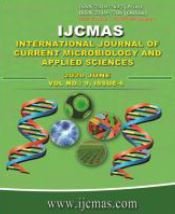


 National Academy of Agricultural Sciences (NAAS)
National Academy of Agricultural Sciences (NAAS)

|
PRINT ISSN : 2319-7692
Online ISSN : 2319-7706 Issues : 12 per year Publisher : Excellent Publishers Email : editorijcmas@gmail.com / submit@ijcmas.com Editor-in-chief: Dr.M.Prakash Index Copernicus ICV 2018: 95.39 NAAS RATING 2020: 5.38 |
The world is facing the challenge of global warming and climate change issues. Environment has been undergoing significant changes due to increasing human population and its activities which, directly and indirectly release GHG into the atmosphere. When fossil fuels are used to generate energy, forest are cut down and burned, carbon dioxide is produced. Even meeting cooking energy requirement through fuel wood, it is a chief source of releasing GHG into the atmosphere. Our day to day activities are dependent on electricity which is mostly coming from coal based, diesel and petrol for our vehicles and LPG for cooking in our kitchen. All of the energy we use is derived from these fossil fuels which are GHG intensive. The present study aims to assess carbon footprint in rural households of Udaipur District. For this purpose, a sample of 120 rural women of 25- 50 years age group from four villages (two Blocks) of Udaipur District were selected. The study was conducted in two phases. In the first phase, household survey was conducted to gather information regarding respondents’ family background, their household fuel consumption pattern, carbon habits and knowledge, and also household carbon footprints of the respondents was calculated. In the second phase educational package was developed. The findings of the study succinctly revealed that respondents average secondary carbon footprint score was 80.06. Only one fifth of the respondents had good secondary carbon footprint scores. Habits play an important role in determining individual’s carbon footprint. The overall mean score of respondents habits related to carbon footprint was 179.02. Moreover, only one third of the respondents had good habits related to carbon footprint. Near about half of the respondents had average knowledge regarding carbon footprint. The average carbon footprint of the respondents was 38.36 metric tonnes which is significant in increasing greenhouse gases leading to global warming. Therefore, rural women should be imparted knowledge related to clean fuels so that they can contribute in reducing the carbon footprint leading to global warming and thus climate change.
 |
 |
 |
 |
 |